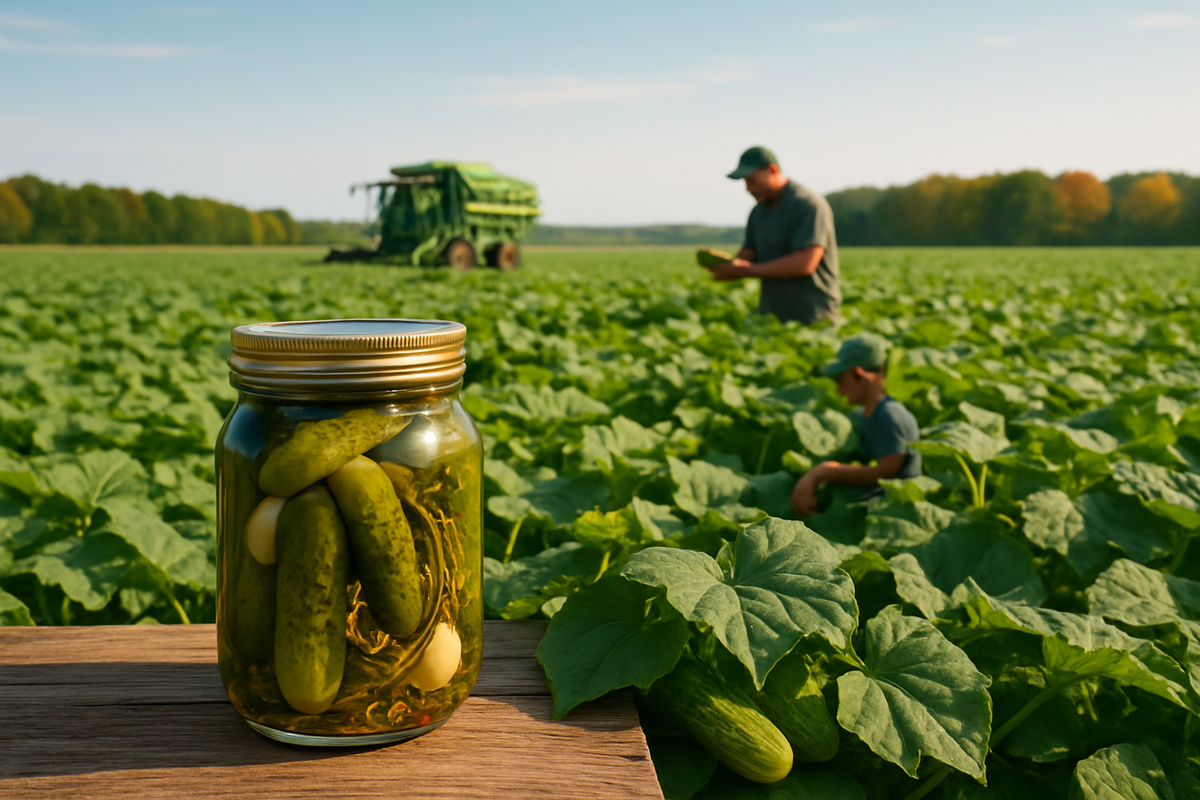
Michigan farmers are increasingly tapping into a lucrative niche, transforming vast fields of cucumbers into a profitable "pickleverse" that is reshaping local agricultural economics. This burgeoning trend highlights a successful strategy of agricultural diversification, offering new revenue streams and bolstering the state's reputation as a leader in specialty crop production. As of September 2025, Michigan continues to dominate national pickling cucumber output, demonstrating how strategic focus on high-value, in-demand commodities can stabilize farm incomes and drive regional economic growth amidst broader agricultural uncertainties.
The immediate implications of this pickle boom are profound for Michigan's agricultural landscape. It provides economic stability for growers, supports a robust local processing infrastructure, and encourages sustainable farming practices through crop rotation. This focus on a value-added product not only insulates farmers from the volatility of staple crop markets but also strengthens the entire supply chain, from seed to shelf, creating jobs and fostering innovation within the state's diverse agricultural sector.
Detailed Coverage: The Rise of Michigan's Pickleverse
Michigan's journey to becoming the undisputed "Pickle Capital" of the U.S. is a testament to its ideal growing conditions, strategic infrastructure, and the entrepreneurial spirit of its farmers. The state consistently ranks first nationally in the production of cucumbers for pickling, a position it has held with remarkable consistency. In 2022, Michigan produced an impressive 216,726 tons of pickling cucumbers, valued at $45.5 million, a figure that remained robust in 2024 with 218,720 tons valued at $42.7 million. This consistent output ensures a steady supply for a global market projected to reach $16.8 billion by 2033, driven by evolving consumer tastes and the rising popularity of fermented foods.
The success of Michigan's pickle industry is not just about raw tonnage; it's also about value-added processing. The state is home to significant processing facilities operated by major players, ensuring that cucumbers are brined and transformed into pickles shortly after harvest, given their extremely short shelf life. This localized processing capability minimizes transportation costs and maximizes freshness and quality. Iconic Michigan-based brands like McClure's Pickles, founded in 2006, have demonstrated the immense profit potential within this niche, expanding their brand awareness and exports significantly. The harvest season typically runs from late July through September, ensuring a fresh supply for processors, with finished products available year-round.
This trend has several immediate benefits for local agriculture. The reliable demand for pickling cucumbers offers a consistent revenue stream, helping farmers weather fluctuations in other commodity markets. The presence of robust processing infrastructure supports local economies by creating jobs and stimulating allied industries. Furthermore, integrating pickling cucumbers into crop rotations contributes to soil health and pest management, aligning with Michigan agriculture's increasing focus on sustainable and organic practices. The state's dedication to specialty crops, including asparagus, blueberries, and tart cherries, is further reinforced by the success of its pickle sector.
Market Movers: Companies Profiting from the Pickle Boom
The robust and consistent supply of pickling cucumbers from Michigan has significant implications for several public companies involved in the pickle industry, creating both winners and those facing intensified competition.
Conagra Brands (NYSE: CAG), through its iconic Vlasic Pickles brand, stands as a primary beneficiary. Vlasic has a substantial production presence in Michigan, with a key plant established in Imlay City. A stable and localized supply of raw materials from the nation's leading producer ensures operational efficiency, potentially reducing transportation costs and strengthening Vlasic's supply chain resilience. This direct access to high-quality cucumbers safeguards and enhances Vlasic's production volume, directly supporting its pickle sales and contributing positively to Conagra's overall revenue within its diversified portfolio. It allows Vlasic to maintain competitive pricing and reinforces its leading market position.
The Kraft Heinz Company (NASDAQ: KHC), another major player in the pickles and pickle products market, also benefits. While specific large-scale cucumber sourcing from Michigan for brands like Heinz pickles might not be exclusively detailed, major food companies often diversify their agricultural sourcing. Consistent high production in Michigan could offer supply stability and potentially favorable raw material costs, improving profit margins on their pickle products. Even if not directly sourcing from Michigan, the increased overall supply in the broader market can exert downward pressure on cucumber prices, indirectly benefiting Kraft Heinz by lowering input costs or intensifying competitive pricing.
Wholesale distributors like United Natural Foods, Inc. (NYSE: UNFI) and The Chefs' Warehouse, Inc. (NASDAQ: CHEF) also stand to gain. UNFI, a major distributor of natural, organic, and specialty foods, and The Chefs' Warehouse, serving culinary professionals, both rely on consistent product availability. Increased pickle production from Michigan ensures a greater supply of products for UNFI to distribute to retailers and for The Chefs' Warehouse to supply to the foodservice sector. This robust availability supports their sales volumes and helps them maintain a diverse and consistent inventory, crucial for their market positions within their respective segments. For The Chefs' Warehouse, Michigan's diverse output could even offer opportunities for sourcing unique or premium pickling cucumber varieties to cater to discerning chefs.
Beyond the Brine: Wider Economic and Agricultural Significance
Michigan's profitable pickle production trend is a powerful illustration of broader agricultural diversification, successful niche market development, and the significant impact on local commodity economics. This success story solidifies Michigan's standing as a highly diverse agricultural state, second only to California, with over 300 commodities cultivated.
The emphasis on pickling cucumbers as a specialty crop provides farmers with a crucial alternative to traditional field crops, which often face greater price volatility. By investing in high-value specialty crops, Michigan farmers enhance their farm income stability and build resilience against market fluctuations. This diversification is actively supported by initiatives like the USDA Specialty Crop Block Grants, which help Michigan enhance the competitiveness and market reach of its specialty crops. The flourishing niche market for pickles also aligns perfectly with the "craft and artisanal food movement." Consumers are increasingly seeking unique flavors, locally sourced ingredients, and healthier, clean-label options. Brands like McClure's Pickles exemplify this trend, showcasing how a focus on premium, distinctive products can command higher prices and cater to a growing segment of health-conscious consumers.
The economic ripple effects of the "PickleVerse" are substantial and localized. The inherent need for rapid processing of fresh cucumbers has led to significant local investment in infrastructure, including brining vats and processing facilities by major companies. For instance, Gielow Pickles' recent $10 million expansion in Lexington, Michigan, is projected to create 100 jobs and increase demand for other Michigan-produced inputs like sugar, salt, and vinegar. This demonstrates a strong economic multiplier effect, supporting allied businesses and local communities, with the entire specialty crop supply chain contributing an estimated $6.3 billion annually to the state's economy.
Michigan's dominance (holding approximately 27% of the national pickling cucumber market) impacts competitors in other states and globally. While other regions may vie for market share, Michigan's established infrastructure, quality focus, and embrace of the artisanal segment help maintain its competitive edge. The industry also strengthens partnerships with seed companies, equipment manufacturers, and logistics providers. However, the industry operates under stringent food safety regulations, requiring licenses and adherence to specific codes, which, while ensuring consumer safety, also present a barrier to entry for smaller-scale producers. Unlike historical commodity booms and busts, Michigan's pickle industry has seen steady, sustained growth, attributed to ideal conditions, robust infrastructure, and evolving consumer demand for niche products.
The Road Ahead: Navigating the Future of Michigan's Pickle Industry
The future of Michigan's pickle industry, while promising, will require continuous adaptation and strategic foresight from farmers and processors alike. In the short term (1-3 years), profitability will remain under pressure from rising input costs for seeds, fuel, and labor. Labor shortages, particularly for specialty crops, will continue to be a significant challenge, driving the need for continued optimization of the H-2A visa program and increased investment in automation. Market demand for diverse and fresh-packed pickles, along with bolder flavors, will persist, offering opportunities for innovative Michigan brands. Climate variability, including increased risks of downy mildew and extreme weather, will also necessitate vigilant crop management and disease control.
Looking further ahead, long-term possibilities point towards transformative changes. Advanced automation and robotics are expected to play an increasingly critical role in harvesting and processing, particularly as technology improves for smaller gherkin varieties. Climate-resilient agriculture will become paramount, requiring the development and adoption of new cucumber varieties tolerant to extreme conditions and diseases. The industry will likely lean more heavily into high-value, niche pickle products—organic, non-GMO, unique flavor profiles, and innovative pickle-based snacks—to differentiate Michigan products and command higher prices, thereby offsetting rising production costs.
Strategic pivots will be essential. Farmers must continue to invest in labor-saving technologies and optimize labor management. Adapting to climate change through integrated pest management and advanced forecasting will be crucial. Strengthening local supply chains and increasing in-state processing capacity will reduce reliance on external factors, fostering direct relationships between growers and manufacturers. Furthermore, emphasizing Michigan's "PickleVerse" reputation through robust marketing and branding will be vital to highlight the quality, sustainability, and unique attributes of its pickles.
Market opportunities abound in the growing consumer demand for specialty foods, the local food movement, and product diversification beyond traditional pickles into other pickled vegetables or fermented foods. E-commerce and direct-to-consumer models also offer avenues for smaller brands to expand reach. However, challenges include competition from other states and international markets, economic volatility, and the ongoing vulnerability to climate change and new plant pathogens. The most likely scenario is sustainable growth driven by specialization, with Michigan brands gaining national recognition in niche segments, supported by automation and climate-resilient practices.
Investor's Digest: Key Takeaways and Future Outlook
Michigan's enduring leadership in pickling cucumber production is a testament to its robust agricultural ecosystem and strategic focus on a high-value specialty crop. The "PickleVerse" demonstrates successful diversification, providing economic stability for farmers and fostering a vibrant local processing industry. This sector's resilience, supported by significant investments and an adaptable farming community, positions it as a cornerstone of Michigan's diverse agricultural economy.
Moving forward, the market for Michigan pickles remains positive, underpinned by strong infrastructure, continuous innovation, and evolving consumer demand for quality and variety. While the broader agricultural sector faces headwinds from rising input costs, trade pressures, and climate variability, Michigan's pickle industry is well-equipped to navigate these challenges through technological adoption, sustainable practices, and a focus on value-added products. The emphasis on local sourcing and the craft food movement further strengthens its market position.
For investors, the Michigan pickle trend highlights the enduring value of niche agricultural markets. The lasting impact is a diversified and resilient agricultural economy that can better withstand external shocks. The "PickleVerse" showcases how a single commodity can build an entire industry, creating jobs and fostering rural economic growth.
Investors should closely monitor several key indicators in the coming months. Watch for fluctuations in agricultural input costs (e.g., fertilizer prices) and broader commodity prices, as these can impact farmer profitability. Keep an eye on trade policies and export dynamics, as changes could affect the ability of Michigan-based processors to access international markets. Climate and crop health reports from sources like Michigan State University Extension are crucial for assessing potential impacts on cucumber yields and quality. Labor market trends, including policy changes and availability, will also influence production costs. Finally, observe announcements regarding investments in processing facilities and infrastructure, as these signal confidence in the long-term growth potential of the industry. Continued consumer interest in locally sourced, organic, and specialty pickle products will also be a key driver of opportunities.
This content is intended for informational purposes only and is not financial advice.





